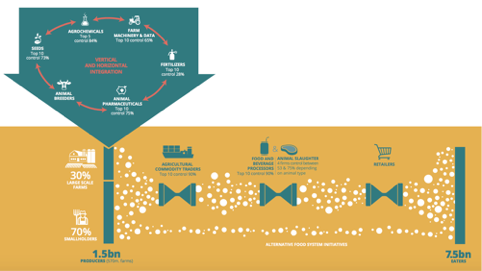News
26 November 2017
Large manoeuvres in the global food system: concentration and financialisation consolidate its industrial nature
Between food producers and consumers, changes in the food system generated a series of bottlenecks that were created by concentration and reconfiguration processes that are characteristic of capitalism. These processes are still on-going. The media are full of information on mergers and takeovers occurring along the food value chain at stages where development of industrial processes make them possible : upstream, at the level of the production and marketing of agricultural equipment and inputs (fertilizers, pesticides and veterinary medicines), and downstream, involving traders, industrialists and large retailers.
According to Greenpeace (2015), four companies (ADM, Bunge, Cargill and Dreyfuss) controlled 75% of the global agricultural commodity trade (grains and soya), ten food processing companies controlled 28% of global food processing and manufacturing, while in 13 countries of the EU, the top 5 retailers’ market share exceeded 60%.
Currently, “a spate of mega-mergers is sparking unprecedented consolidation in the seed, agri-chemical, fertilizer, animal genetics and farm machinery industries, while creating ever-bigger players in the processing and retail sectors”, This process is driven in part by new data technologies that allow “companies to bring satellite data services, input provision, farm-level genomic information, farm machinery, and market information under one roof, transforming agriculture in the process”. This is what can be read in a report on this issue published last month by the International Panel of Experts on Sustainable Food Systems (IPES-Food) co-chaired by O. de Schutter, former UN Special Rapporteur on the Right to Food.
Concentration is still on the way, narrowing every day the bottlenecks already stressed by Greenpeace in 2015, but also - and that is a relatively new development - increasing vertical integration through greater financialisation of the food economy, thus reinforcing further the industrial model dominating our food system (see diagram).

Source: Mooney, P., 2017 Download diagram :Food system.png
Examples quoted in the report are manoeuvres occurring in the agrochemical sector that mobilised each several dozens of billions of dollars (merger of Dow and DuPont, Bayer buying Monsanto, ChemChina’s acquiring Syngenta before the envisaged merger with Sinochem in 2018). Similar operations took place in the food industry (Kraft-Heinz and Unilever) and in retailing (Amazon and Whole Foods Market), often mobilising big financial actors.
Among the impacts listed by the IPES-Food report, some are particularly worrying for the future of our food system:
-
•“The scope of research and innovation has narrowed as dominant firms have bought out the innovators and shifted resources to more defensive modes of investment”;
-
•On-going manoeuvres and “product rebranding [are] eroding commitments to sustainability, dissipating accountability, and opening the door to abuse and fraud”;
-
•Expanded opportunities for adopting monopolistic behaviours and for eliminating innovators constitute increased threats on sustainability of our food system.
As a result, the IPES-Food report makes several recommendations, such as:
-
•Building a new anti-trust environment with measures to realign incentives to make them more compatible with the emergence of sustainable food systems and geared to address the root causes of consolidation;
-
•Support a shift towards diversified and decentralized innovation, production of locally-applicable knowledge and open access technologies in order to “harness the benefts of Big Data for all”;
-
•Design food policies supporting emergence of short supply chains - instead of penalising them [read], « innovative distribution and exchange models… to circumvent, disrupt, and de-consolidate mainstream supply chains”.
Implementing these recommendations, that are largely in line with what we have mentioned on several occasions on hungerexplained.org and to which we would add the need for specifically funding decentralised and local research, requires a change in the current power balance that is strongly in favour of a coporation-led and highly centralised industrial food system.
There are signs that the public is increasingly conscious of the excesses of the food system and is starting to exert pressure on it, including by changing consuming habits. [read] Public awareness is also progressively finding some, although yet limited, expression in the political arena.
A process is in motion. For success to be achieved in reengineering our food system to make it sustainable, there will be a need to combine policy changes at global, regional and national level, with local initiatives. Either of these prongs taken alone will fail and to achieve success, they will all need to be implemented simultaneously.
———————————
To know more:
-
•Mooney, P. (Coordinator), Too big to feed - Exploring the impacts of mega-mergers, consolidation and concentration of power in the agri-food sector, IPES-Food. 2017.
-
•Baker, M. et al, Ecological farming - The seven principles of a food system that has people at its heart, Greenpeace, 2015
Earlier articles on hungerexplained.org related to the topic:
-
•What are the challenges to be met in order to secure a sustainable future for our food system? 2017
-
•Are existing food and agricultural policies supportive to local sustainable food systems?, 2015
-
•Ecological farming at the center of the food system called for by Greenpeace, 2015
-
•The large multinational corporations in charge of our agri-food system...: upstream corporations, 2014
-
•Le système agricole et alimentaire international à la recherche d’une bonne image, 2013 (in French only)
Last update: November 2017
For your comments and reactions: hungerexpl@gmail.com




